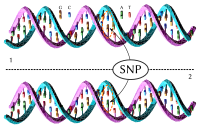Single nucleotide polymorphism

A single nucleotide polymorphism, or SNP for short, is like a tiny spelling mistake in your body's instruction manual, called DNA.
You know how when you're learning to spell, you have to practice making sure all the letters are right? Well, DNA is made up of letters too, except instead of A, B, and C, they're called A, T, C, and G. Imagine these letters are like puzzle pieces that fit together to make a word, like CAT or DOG.
Now, sometimes when your body is copying its instruction manual, it accidentally puts the wrong letter in the wrong spot, like writing DOB instead of DOG. That's what a SNP is - a mistake in one of these letters.
For example, let's say your DNA has the instructions for making the color of your eyes. Most people have either brown, blue, or green eyes, but sometimes there's a SNP that changes one of the letters in the instruction manual, which can result in someone having hazel or gray eyes instead.
SNPs can happen randomly, or they can be inherited from your parents. They might not seem like a big deal, but they can actually affect things like your risk for certain diseases, how your body processes medications, and even your physical traits like your eye color. Scientists study SNPs to learn more about how they work and how they can affect our bodies.
You know how when you're learning to spell, you have to practice making sure all the letters are right? Well, DNA is made up of letters too, except instead of A, B, and C, they're called A, T, C, and G. Imagine these letters are like puzzle pieces that fit together to make a word, like CAT or DOG.
Now, sometimes when your body is copying its instruction manual, it accidentally puts the wrong letter in the wrong spot, like writing DOB instead of DOG. That's what a SNP is - a mistake in one of these letters.
For example, let's say your DNA has the instructions for making the color of your eyes. Most people have either brown, blue, or green eyes, but sometimes there's a SNP that changes one of the letters in the instruction manual, which can result in someone having hazel or gray eyes instead.
SNPs can happen randomly, or they can be inherited from your parents. They might not seem like a big deal, but they can actually affect things like your risk for certain diseases, how your body processes medications, and even your physical traits like your eye color. Scientists study SNPs to learn more about how they work and how they can affect our bodies.
Related topics others have asked about:
